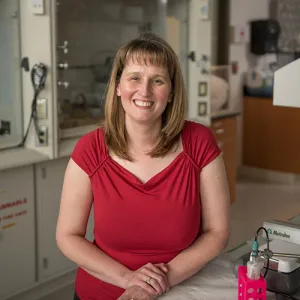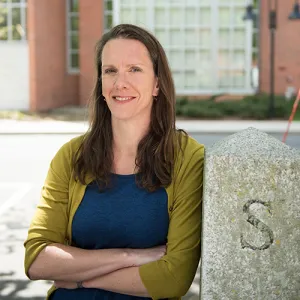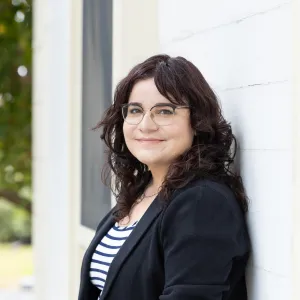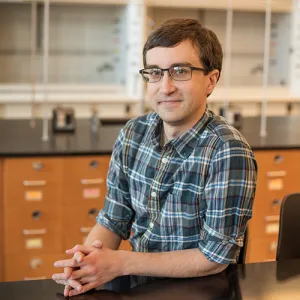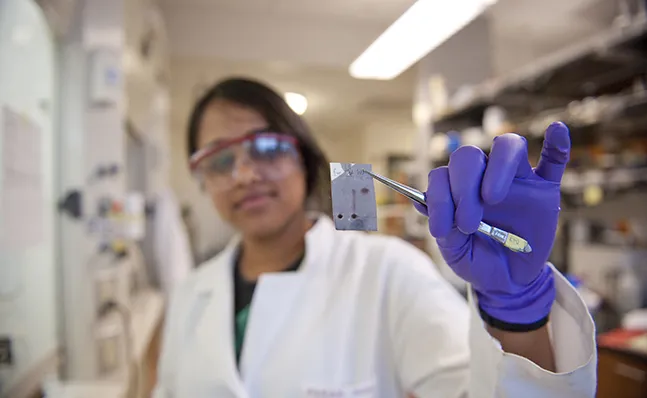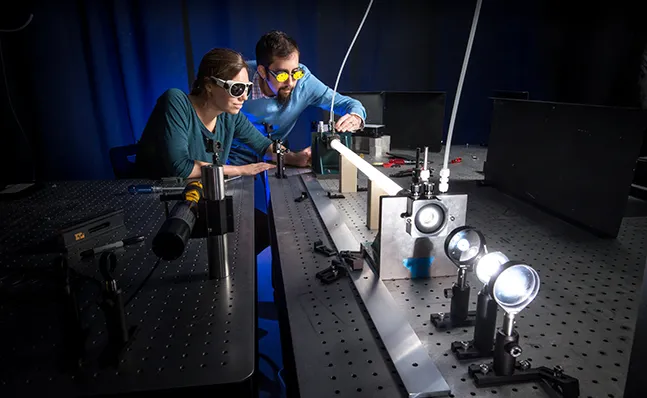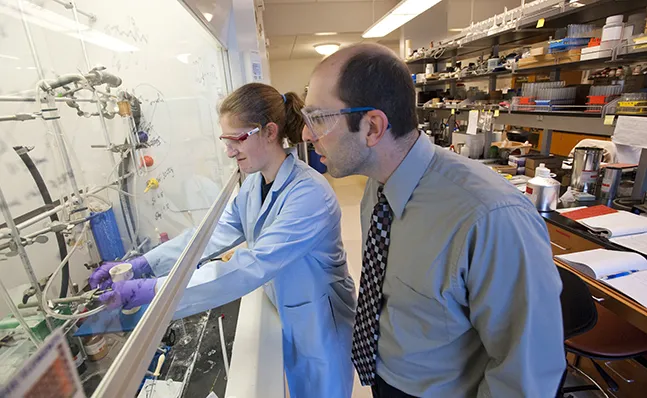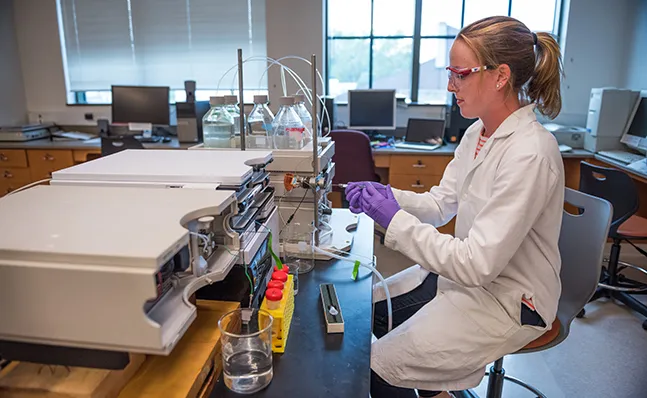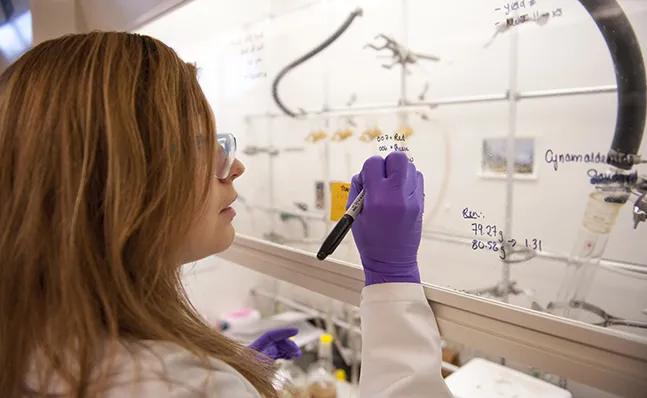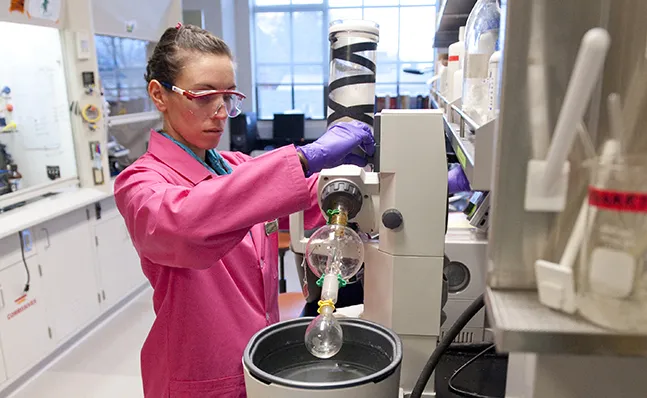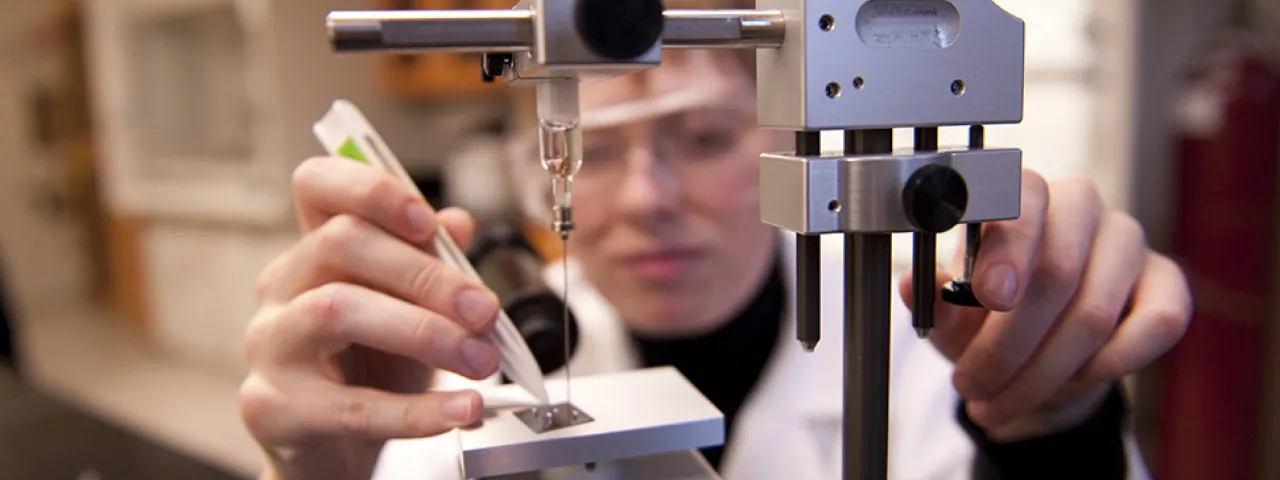
Chemistry
“Chemistry is a substantial science by the measures of industry, economics, and politics. As an academic discipline, it underlies the vibrant growth of molecular biology, materials science, and medical technology. Although not the youngest of sciences, its frontiers continue to expand in remarkable ways. And although it shares boundaries with every other field of science, it has an autonomy, both methodologically and conceptually.” —Of Minds and Molecules: New Philosophical Perspectives on Chemistry, Nalini Bhushan and Stuart Rosenfeld, editors (Oxford University Press, 2000).
Department Updates
Thinking of taking Intro Chem (CHM 111) in the fall? Please read the placement info below!
Looking for student research opportunities in the department? Check out the Student Research tab.
Events
Requirements & Courses
Goals for Majors in Chemistry
- Ability to “tell a good story” about chemistry
- Read/write a scientific paper
- Design experiments
- Interpret data
- Transfer knowledge between discrete course units
- Authentic engagement with learning/exploration
- Information literacy (chemistry-specific)
- Thirty-four different desired areas of content mastery
Chemistry Major
Requirements
Ten courses
- Introductory sequence, either:
- CHM 111/CHM 111L, CHM 222/CHM 222L and CHM 224
/CHM 224L or - CHM 118/CHM 118L and CHM 222/CHM 222L
- CHM 111/CHM 111L, CHM 222/CHM 222L and CHM 224
- Three of the following courses: CHM 223/CHM 223L, CHM 331, CHM 332/CHM 332L and CHM 363
- Two of the following advanced lab courses: CHM 326, CHM 336 and CHM 346
- Two or three elective courses (options listed below) to equal a total of 10 courses.
- Any CHM courses at the 300 level or above
- BCH 252, BCH 352, GEO 301, PHY 319, PHY 327 or a topic of PHY 360
- CHM 400 CHM 430D or CHM 432D (worth four or more credits), may be used as one (only) elective
Courses fulfilling the major requirements may not be taken S/U with the exception of CHM 400.
Preparation for Graduate Study
Students planning graduate study in chemistry are advised to work with their adviser to identify courses outside the major that may be relevant for graduate study in particular subfields. A major program that includes the required courses, one semester of biochemistry and additional laboratory experience in the form of (a) two semesters of research (CHM 400, CHM 430D and/or CHM 432D), (b) one semester of research and one elective course with laboratory, or (c) three elective courses with laboratories meets the eligibility requirements of the American Chemical Society for professional standing.
Honors
Please consult the director of honors or the departmental website for specific requirements and application procedures.
Chemistry Minor
The courses specified below constitute a four-semester introduction to chemistry. The semesters are sequential, giving a structured development of chemical concepts and a progressive presentation of chemical information. Completion of the minor with at least one additional course at the intermediate or advanced level affords the opportunity to explore a particular area in greater depth.
Requirements
Five courses
- Either:
- CHM 111 and CHM 111L, CHM 222 and CHM 222L, and CHM 224 and CHM 224L or
- CHM 118 and CHM 118L and CHM 222 and CHM 222L
- One additional course with a laboratory component: CHM 223 and CHM 223L, CHM 332 and CHM 332L, CHM 326, CHM 336 or CHM 346
- One or two electives from the following to fulfill a total of five courses: Any CHM courses at the 300 level or above, BCH 252 or BCH 352
Courses fulfilling the minor requirement may not be taken S/U.
Courses
CHM 100ao Topics on Perspectives in Chemistry-Chemistry of Art Objects (4 Credits)
In this museum-based course, chemistry is discussed in the context of art. The course focuses on materials used by artists and how the chemistry of these materials influences their longevity. Current analytical methods as well as preservation and conservation practices are discussed along with examples from the Smith College Museum of Art. Restrictions: CHM 100 may not be repeated. Enrollment limited to 16. {A}{N}
Spring
CHM 108/ ENV 108 Environmental Chemistry (4 Credits)
Offered as CHM 108 and ENV 108. An introduction to environmental chemistry, applying chemical concepts to topics such as acid rain, greenhouse gases, air quality, pesticides and waste treatment. Chemical concepts are developed as needed. {N}
Spring
CHM 110 Quantitative Approaches to Chemistry (1 Credit)
Using chemical reactions to make quantitative predictions is a foundational skill in chemistry. This skill is built on a set of quantitative approaches including dimensional analysis, reaction stoichiometry and physical measurement. Students build and refine these skills through both individual and group work in a small class setting. This course is a co- or prerequisite for CHM 111; students are recommended for this course on the basis of a short placement exam. For these students, successful completion of CHM 110 is required to enter any CHM courses with a CHM 111 prerequisite. Enrollment limited to 60.
Fall
CHM 111 Chemistry I: General Chemistry (4 Credits)
The first semester of our core chemistry curriculum introduces the language(s) of chemistry and explores atoms, molecules and their reactions. Discussions include electronic structures of atoms, structure shape and properties of molecules; reactions and stoichiometry. Enrollment limited to 16 per lab section. Multiple sections are offered at different times, as detailed in the Schedule of Classes. At the time of registration students must register for both a lecture and a lab section that fit their course schedule. Corequisite: CHM 111L. Restrictions: Not open to students who have taken CHM 118. Enrollment limited to 40. {N}
Fall
CHM 111L Chemistry I Lab: General Chemistry Lab (1 Credit)
Lab Section. The first semester of our core chemistry curriculum introduces the language(s) of chemistry and explores atoms, molecules and their reactions. Topics covered include electronic structures of atoms, structure shape and properties of molecules; reactions and stoichiometry. Multiple sections are offered at different times, as detailed in the Schedule of Classes. At the time of registration students must register for both a lecture and a lab section that fit their course schedule. Corequisite: CHM 111. Enrollment limited to 16. {N}
Fall
CHM 118 Advanced General Chemistry (4 Credits)
This course is for students with a very strong background in chemistry. The elementary theories of stoichiometry, atomic structure, bonding, structure, energetics and reactions are quickly reviewed. The major portions of the course involve a detailed analysis of atomic theory and bonding from an orbital concept, an examination of the concepts behind thermodynamic arguments in chemical systems, and an investigation of chemical reactions and kinetics. The laboratory deals with synthesis, physical properties and kinetics. The course prepares students for CHM 222 and CHM 223, and replaces both CHM 111 and CHM 224. Corequisite: CHM 118L. Restrictions: Not open to students who have passed either CHM 111 or CHM 224. Enrollment limited to 40. {N}
Fall
CHM 118L Advanced General Chemistry Laboratory (1 Credit)
Lab course for CHM 118. This course is for students with a very strong background in chemistry and provides a foundation in basic lab technique, particularly for quantitative analytical measurements. It begins with an introduction to light as a tool for investigating aspects of chemical systems such as acid/base behavior and metal-ligand chemistry. The second half of the lab consists of a project module where students develop greater independence in their chemistry skills while investigating the behavior of one particular chemical system in depth. Each student also learns to keep a laboratory notebook, prepare scientific reports and presentations, and work safely in a chemical environment. Corequisite: CHM 118. Enrollment limited to 16. {N}
Fall
CHM 222 Chemistry II: Organic Chemistry (4 Credits)
An introduction to the theory and practice of organic chemistry. The course focuses on structure, nomenclature, physical and chemical properties of organic compounds and infrared and nuclear magnetic resonance spectroscopy for structural analysis. Reactions of carbonyl compounds and alkenes are studied in depth. Prerequisite: CHM 111/111L, CHM 114/114L or CHM 118/118L. Corequisite: CHM 222L. Multiple sections are offered at different times. At the time of registration, students must register for both a lecture (CHM 222) and a lab (CHM 222L) section that fit their course schedule. Enrollment limited to 40. {N}
Spring
CHM 222L Chemistry II Lab: Organic Chemistry Lab (1 Credit)
Lab section for Organic Chemistry. An introduction to the theory and practice of organic chemistry. The course focuses on structure, nomenclature, physical and chemical properties of organic compounds and infrared and nuclear magnetic resonance spectroscopy for structural analysis. Reactions of carbonyl compounds and alkenes are studied in depth. Corequisite: CHM 222. Prerequisite: CHM 111/111L, CHM 114/114L or CHM 118/118L. Enrollment limited to 16. Multiple sections are offered at different times. At the time of registration, students must register for both a lecture (CHM 222) and a lab (CHM 222L) section that fit their course schedule. {N}
Spring
CHM 223 Chemistry III: Organic Chemistry (4 Credits)
Material builds on introductory organic chemistry topics covered in CHM 222 and focuses more heavily on retrosynthetic analysis and multistep synthetic planning. Specific topics include reactions of alkyl halides, alcohols and ethers; aromaticity and reactions of benzene; and cycloaddition reactions including the Diels-Alder reaction. Prerequisite: CHM 222/222L. Corequisite: CHM 223L. Enrollment limited to 40. {N}
Fall
CHM 223L Chemistry III Lab: Organic Chemistry Lab (1 Credit)
Lab section. Material builds on introductory organic chemistry topics covered in CHM 222 and focuses more heavily on retrosynthetic analysis and multistep synthetic planning. Specific topics include reactions of alkyl halides, alcohols and ethers; aromaticity and reactions of benzene; and cycloaddition reactions including the Diels-Alder reaction. Corequisite: CHM 223. Prerequisite: CHM 222/ CHM 222L, or equivalent. Enrollment limited to 16. {N}
Fall
CHM 224 Chemistry IV: Introduction to Inorganic and Physical Chemistry (4 Credits)
This final course in the chemistry core sequence provides a foundation in the principles of physical and inorganic chemistry that are central to the study of all chemical phenomena. Discussions include quantitative treatment of thermochemistry, chemical equilibria, electrochemistry and reaction kinetics. Corequisite: CHM 224L. Prerequisites: CHM 111 and CHM 111L or equivalent. MTH 111 recommended but not required. Enrollment limited to 40. {N}
Spring
CHM 224L Chemistry IV Lab: Introduction to Inorganic and Physical Chemistry (1 Credit)
Lab section. This final course in the chemistry core sequence provides a foundation in the principles of physical and inorganic chemistry that are central to the study of all chemical phenomena. Discussions include quantitative treatment of thermochemistry, chemical equilibria, electrochemistry and reaction kinetics. Corequisite: CHM 224. Prerequisites: CHM 111/111L or equivalent. MTH 111 recommended but not required. Enrollment limited to 16. {N}
Spring
CHM 312 Polymer Chemistry (4 Credits)
Polymeric materials are ubiquitous in society and play a vital role in many of the technologies that humans use on a daily basis (e.g., clothing, electronic devices, drug formulations, medical implants). Chemistry is central to the development of new materials for advanced technologies and this course provides an introduction to the fields of polymer chemistry and macromolecular assembly. Discussions include methods and mechanisms in polymer synthesis and assembly, characterization of polymer structure and properties, and applications of polymers. Special focus is given to polymers used in biomedical applications. Prerequisite: CHM 111 or CHM 118; and CHM 222. An understanding of basic chemical principles and an introduction to organic chemistry is necessary for students to understand topics in polymer chemistry. Enrollment limited to 15. {N}
Fall, Spring, Alternate Years
CHM 321 Organic Synthesis (4 Credits)
An examination of modern methods of organic synthesis and approaches to the synthesis of complex organic compounds with a focus on the current literature. Prerequisite: CHM 223. Enrollment limited to 24. {N}
Spring, Alternate Years
CHM 326 Synthesis and Structural Analysis (4 Credits)
Synthetic techniques and experimental design in the context of multistep synthesis. The literature of chemistry, methods of purification and characterization with a focus on NMR spectroscopy, mass spectrometry and chromatography. Prerequisite: CHM 223. Enrollment limited to 18. {N}
Spring
CHM 328 Bioorganic Chemistry (4 Credits)
Applications of chemical tools and synthetic molecules to the study of biological systems. Emphasis is on emerging strategies to study living systems at the molecular level, primary scientific literature and critical review of manuscripts. Discussions include biorthogonal chemistry, synthetic small-molecule probes to interrogate biological systems, protein engineering, proteomics, advances in DNA sequencing, genomics, directed evolution and natural product biosynthesis. Prerequisite: CHM 223. Enrollment limited to 18. {N}
Spring, Alternate Years
CHM 331 Physical Chemistry: Quantum Mechanics (4 Credits)
Quantum chemistry: an introduction to quantum mechanics, the electronic structure of atoms and molecules, with applications in spectroscopy. Prerequisites: CHM 118 or CHM224 and MTH 112 or MTH 114; strongly recommended: MTH 212 or PHY 210, and PHY 115 or PHY 117. {N}
Fall
CHM 332 Physical Chemistry: Thermodynamics and Kinetics (4 Credits)
Thermodynamics and kinetics: will the contents of this flask react, and if so, how fast? Explores the properties that govern the chemical and physical behavior of macroscopic collections of atoms and molecules (gases, liquids, solids and mixtures thereof). Corequisite: CHM 332L. Prerequisites: CHM 118 or CHM 224; and MTH 112. Enrollment limited to 24. {N}
Spring
CHM 332L Laboratory-Physical Chemistry: Thermodynamics and Kinetics (1 Credit)
Laboratory accompanying CHM 332. This lab investigates the concepts of heat, energy, and entropy in order to explain why chemical processes occur the way they do. Experiments include solution and combustion calorimetry, polymer thermodynamics, equilibrium monitored by NMR, and reaction kinetics. Corequisite: CHM 332. Prerequisites: CHM 118 or CHM 224; and MTH 112. Enrollment limited to 12. {N}
Spring
CHM 336 Light and Chemistry (4 Credits)
The interaction of light with molecules is central to studies of molecular structure and reactivity. This course builds on students’ understanding of molecular structure from the core sequence (CHM 111-CHM 224) to show how many types of light can be used to interrogate molecules and to shed some light on their behavior. The combined classroom/laboratory format allows students to explore light-based instruments in short, in-class exercises as well as in longer, more traditional labs. The course culminates with an independent project that allows students to explore some of the ways light is used in cutting-edge chemical research. Prerequisites: CHM 222 or equivalent. Enrollment limited to 20. {N}
Spring
CHM 337 Materials Chemistry (4 Credits)
This course provides an introduction to the interdisciplinary field of materials from a chemist's viewpoint. Students learn fundamentals of solid state chemistry as well as techniques used to synthesize and characterize materials (including crystalline and amorphous solids as well as thin films). These concepts are applied to current topics in materials chemistry, culminating in a final paper and oral presentation on a topic of each student's choice. Prerequisites: CHM 224 or equivalent. Enrollment limited to 20. {N}
Fall, Spring, Variable
CHM 339 Physical Organic Chemistry (4 Credits)
The study of the relationship between molecular structure, stability and reactivity. This course describes a series of tools to analyze reaction mechanisms, including reaction kinetics, linear free energy relationships, principles of computational analysis, frontier molecular orbitals and isotope effects. Ground state properties are discussed with respect to conformational analysis, sterics and strain, aromaticity, and bond strength and acidity. Students learn to process mechanistic data from the literature to understand mechanistic arguments. Students also learn to analyze a problem to design and propose experiments to reveal mechanistic insights. Prerequisites: CHM 222, CHM 223 and either CHM 118 or CHM 224. Enrollment limited to 25. {N}
Fall, Alternate Years
CHM 346 Environmental Analytical Chemistry (4 Credits)
An introduction to some common environmental chemical processes in air, soil and water, coupled with a study of the crucial role of accurate chemical measurement of these processes. Lecture and laboratory featuring modern chemical instrumentation for spectroscopy (atomic and molecular) high performance chromatographic separations (both gas and liquid), electrochemistry as well as microwave- and ultrasound-assisted sample preparation, and a short project linked to local faculty research interests. Oral presentations and formal laboratory reports required. Prerequisite: CHM 118 or CHM 224 or equivalent. Enrollment limited to 20. {N}
Fall
CHM 350 Chemical Ecology: Catch Fe if You Can (4 Credits)
Chemistry is the language through which organisms communicate within the environment, which can be exploited for new therapeutics, industrial chemicals and molecules for bioremediation. Students explore the soils and plants of the Smith College Botanic Garden to find bacterial iron-chelating molecules or siderophores, which can be used to clean up metal pollution. Students learn how to do microbial isolation and cultivation from environmental samples, genomic sequencing, chemical extraction, liquid chromatography/mass spectrometry, bioinformatic analyses and enzyme assays. Experimental findings are summarized in written reports and presented at an end-of-semester poster session. Prerequisites: CHM 118 or CHM 224; CHM 222; and BIO 132, an equivalent or AP Biology. Enrollment limited to 18. {N}
Fall, Alternate Years
CHM 363 Advanced Inorganic Chemistry (4 Credits)
Application of group theory, coordination compounds, molecular orbital theory of main group compounds and other selected topics in inorganic chemistry. Prerequisite: CHM 118 or CHM 224. {N}
Spring
CHM 369 Bioinorganic Chemistry (4 Credits)
This course provides an introduction to the field of bioinorganic chemistry. Students learn about the role of metals in biology as well as about the use of inorganic compounds as probes and drugs in biological systems. Prerequisites: CHM 223 and either CHM 118 or CHM 224.
Fall, Variable
CHM 400 Special Studies (1-4 Credits)
S/U only. Instructor permission required.
Fall, Spring
CHM 430D Honors Project (4 Credits)
Department permission required.
Fall, Spring
CHM 432D Honors Project (6 Credits)
Department permission required.
Fall, Spring
Crosslisted Courses
BCH 252 Biochemistry I: Biochemical Structure and Function (3 Credits)
Structure and function of biological macromolecules: proteins and nucleic acids. Mechanisms of conformational change and cooperative activity; and bioenergetics, enzymes and regulation. Concurrent registration in BCH 253 is required for biochemistry majors. Prerequisites: CHM 111 or CHM 118, CHM 222 and BIO 132. Enrollment limited to 78. {N}
Spring
BCH 352 Biochemistry II: Biochemical Dynamics (3 Credits)
Chemical dynamics in living systems. Enzyme mechanisms, metabolism and its regulation, energy production and utilization. Concurrent registration in BCH 353 is required for biochemistry majors. Prerequisites: BCH 252, CHM 223, CHM 224 and BIO 202. {N}
Fall
Additional Programmatic Information
Honors Director
Maren Buck
430d Thesis
8 credits, full-year course; offered each year
432d Thesis
12 credits, full-year course; offered each year
Requirements
Same as for the major, with the addition of a research project in the senior year culminating in a written thesis and an oral presentation. Faculty members will question honors students about their research.
To enter the honors program, you must have a minimum GPA of 3.0 in the major and a minimum overall GPA of 3.0. Students may apply no earlier than the end of the second semester junior year and no later than the beginning of first semester senior year.
Visit the Class Deans’ website to learn more about the honors program, deadlines and applying. Application forms and a project proposal must be submitted to the chemistry honors director for approval by the department.
Evaluation
The final honors designation (Highest Honors, High Honors, Honors, Pass or Fail) will be based upon evaluation of the written thesis (50%), oral presentation (20%) and the GPA in the major (30%).
Deadlines
If you have questions regarding the honors program or deadlines, please contact Maren Buck.
To graduate from Smith with a certification from the American Chemical Society, you must satisfy the following five requirements:
- Complete CHM 111/111L and CHM 224/224L (or CHM 118/118L)
- Take courses in each of the five major areas of chemistry: analytical, biochemistry, inorganic, organic and physical. To satisfy this requirement you would take:
- Analytical: two out of three from CHM 326, CHM 336 and CHM 346
- Biochemistry: BCH 252
- Inorganic: CHM 363
- Organic: CHM 222/222L
- Physical: CHM 332
- Include a minimum of at least 12 semester hours of in-depth coursework. This is satisfied by taking four courses from the following list: BCH 352, CHM 223/223L, CHM 321, CHM 328, CHM 331, CHM 338, CHM 369.
- Have a total of 400 hours of laboratory experience. This can be achieved at Smith in many ways. A typical example is taking the general chemistry course, the required organic course and the two lab courses required for the chemistry major, which totals 215 hours. Two other courses with labs within your program and a one-semester special studies will give you more than 400 lab hours.
- Math and physics requirements include MTH 111 and MTH 112 or MTH 114. You will also need PHY 117 and PHY 118 and the accompanying labs.
Possible Schedule for Certification
Note that many of the courses can be taken at different times than given here; this is one possible choice.
First Year
- CHM 111 (with lab)
- CHM 222 (with lab)
- MTH 111
- MTH 112
Second Year
- CHM 223 (with lab)
- CHM 224 (with lab)
- CHM 326 (with lab)
- PHY 117 (with lab)
- PHY 118 (with lab)
Third Year
- CHM 331
- CHM 363
- CHM 336 (elective; with lab)
- CHM elective
- BCH 252
Fourth Year
- CHM 400/430 (with lab)
- CHM 332 (with lab)
- CHM 430 (with lab)
- CHM elective
The following example shows one possible major pathway fulfilling minimum requirements for a major.
First Year
- CHM 111 (required; with lab)
- CHM 222 (required; with lab)
Second Year
- CHM 224 (required; with lab)
- CHM 223 (required; with lab)
- CHM 326 (elective; with lab)
Third Year
- CHM 331 (optional)
- CHM 332 (optional; with lab)
- CHM 346 (elective; with lab)
- CHM 336 (elective; with lab)
Fourth Year
- CHM 363 (optional)
- Two CHM electives
There are many possibilities for a major. For various career objectives it may be useful to take additional courses. Please discuss this with your adviser. Here are some example majors for a student who:
- plans on a profession in chemistry.
- wants to fulfill medical school requirements.
- is interested in a career in environmental chemistry.
- doesn’t start the chemistry program until her second year.
- wishes to spend her junior year away.
Schedule for a Professional Chemist
Note that the courses in the junior and senior years can be taken in many different arrangements from that given here; this is one possible choice.
First Year
- CHM 111 (with lab)
- CHM 222 (with lab)
Second Year
- CHM 223 (with lab)
- CHM 224 (with lab)
- CHM 336 (with lab)
Third Year
- CHM 331
- CHM 363
- CHM 338
- CHM 326 (with lab)
Fourth Year
- CHM 346 (with lab)
- CHM 332 (with lab)
- CHM 430 (with lab)
Schedule in Preparation for Medical School
Consult with an adviser about the many possibilities here. You can also consult prehealth advising.
First Year
- CHM 111 (with lab)
- CHM 222 (with lab)
Second Year
- CHM 223 (with lab)
- CHM 224 (with lab)
- CHM 326 (with lab)
- BCH 252
Third Year
- CHM 331
- CHM 363
- BCH 352
Fourth Year
- CHM 336 (with lab)
- CHM 430 (with lab)
Environmental Chemistry
Some of the public policy courses in the environmental sciences minor might be of interest; talk with an adviser.
First Year
- CHM 111 (with lab)
- CHM 222 (with lab)
Second Year
- CHM 224 (with lab)
- CHM 336 (with lab)
Third Year
- CHM 346 (with lab)
- CHM 332 (with lab)
- GEO 301 (with lab)
Fourth Year
- CHM 331
- CHM 363
- CHM 430 (with lab)
- CHM 430 (with lab)
Sophomore Year Start
A chemistry program is relatively easy to start even after one year without chemistry.
Second Year
- CHM 111 (with lab)
- CHM 222 (with lab)
Third Year
- CHM 223 (with lab)
- CHM 224 (with lab)
- BCH 252
Fourth Year
- CHM 331
- CHM 332 (with lab)
- CHM 346 (with lab)
- CHM 336 (with lab)
- CHM 321
Junior Year Away
Planning ahead is crucial to doing a junior year abroad.
First Year
- CHM 111 (with lab)
- CHM 222 (with lab)
Second Year
- CHM 223 (with lab)
- CHM 224 (with lab)
Third Year
- Elective abroad
Fourth Year
- CHM 331
- CHM 363
- CHM 346 (with lab)
- CHM 326 (with lab)
CHM 111 is the introductory chemistry course for students who have had 0-1 years of high school chemistry. We recommend that students who have more extensive preparation in chemistry (2+ years of HS chemistry, a 4 or 5 on the AP Chem exam, IB experience) take CHM 118 and CHM 118L in the fall. These students also have the option of placing directly into CHM 222 (Organic Chemistry I) in the spring but should consult a member of the department before choosing this path. All students considering CHM 111 should follow the instructions below to complete a short placement exercise.
Placement Exercise 2025
The Department of Chemistry offers an online placement tool to help assess students’ prior preparation in chemistry. The exercise tests molar mass and basic stoichiometry (using balanced chemical reaction equations). It is accessible on Moodle and consists of five numerical questions.
You will need a calculator and access to a periodic table. We provide a link to an online periodic table on Moodle directly underneath the link to the exercise. It is very important that you use scrap paper or the writing surface/instrument of your choice to work out the problems on the exercise—in most cases you are unlikely to get the correct answers without writing down work. To make sure we understand how students did the work for this exercise, we will ask you to upload a picture of your work at the end of the quiz.
Please read the instructions on the Moodle page before you start the exercise, and pay attention to any instructions with each question. We expect it will take most students less than one hour to answer all the questions (not including any extra time accommodations if you normally use them), but there is no time limit.
Who should complete this exercise?
All students who are planning to take CHM 111 (introductory chemistry for students with 0-1 years of high school chemistry) should take this. We expect a range of chemistry backgrounds in our incoming students, and because of that we also expect a wide range of scores on this exercise. If you are planning to take CHM 118, because you took 2+ years of high school chemistry (including AP or IB chemistry), you do NOT need to take this placement exercise.
How will you use my results?
Your results will help us determine if you should also take an additional 1-credit course, CHM 110, at the same time as CHM 111. Note that your score on this exercise has no relationship to how well you will do in first-semester chemistry or beyond. Guidance on how to interpret your score will be given to you with your final score once you submit your answers to the exercise. First-years are also welcome (and encouraged) to discuss that guidance with a Chemistry faculty member at Conversations on Sept. 2.
How do I take the placement exercise?
Go to the following link: https://moodle.smith.edu/course/view.php?id=54303
When you are asked for the Enrollment Key, enter: molecule
Make sure to hit the “Submit all and finish” button after submitting the photo of your work for the final question.
Faculty
Emeriti
Faculty Mentoring Plan
Research
At Smith, undergraduate research is integral to the study of chemistry. You have exciting opportunities to conduct research within the department and during the summer.
Students and faculty use an array of advanced instrumentation for research and in classes. The department houses the following instruments:
Why Study Chemistry at Smith?
Faculty and students in the chemistry department share a love for learning and applying what we learn in the classroom to interesting problems in the lab.
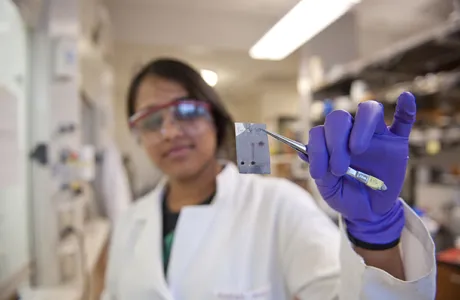
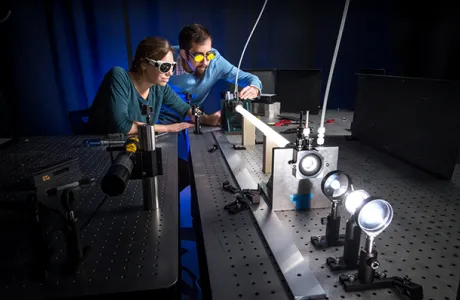
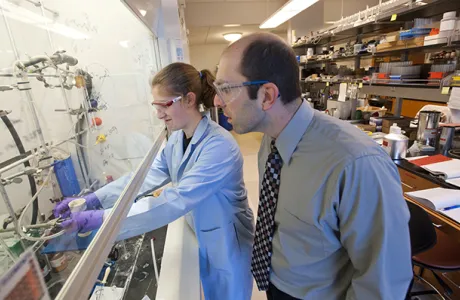
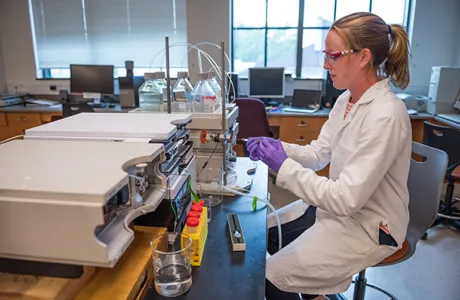
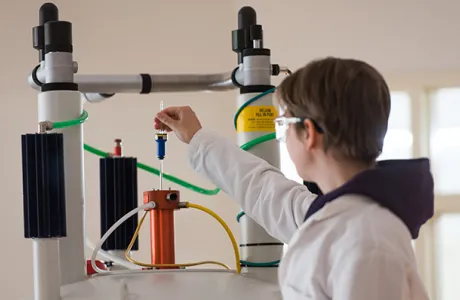
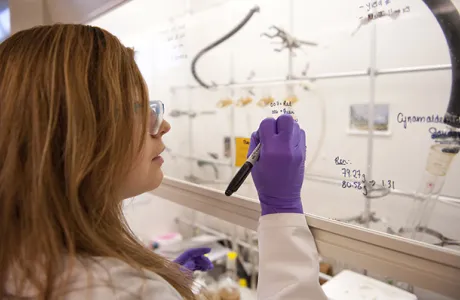

Resources & Lab Safety
Our Mission
To see full details and practical safety information regarding regular research and instruction, please visit Smith's Research & Instruction Safety website.
The American Chemical Society advocates for the safe practice of chemistry. We follow their guidelines and recommendations. Visit their site to learn about a variety of resources and tools
To Help You In and Out of Class
- Visit the Science Center Computing and Technical Services (CATS) supported software webpage to access a variety of scientific software.
- Smith chemistry students have access to CHEMDRAW a chemical drawing tool that professionals use. To get your own copy of the tool, go to the CATS supported software webpage (link above) and follow their instructions.
- WebMO is a web-based interface to computational chemistry packages. Instructions to use WebMO
- The Jacobson Center will work with you to improve your writing and learning skills. The Spinelli Center for Quantitative Learning will support students doing quantitative work across the curriculum. They offer chemistry tutoring, workshops and class study sessions outside the regular classroom.
Study Abroad Adviser: Maria Bickar
The chemistry major is designed to allow students to enjoy either a semester or a year away in a study abroad program. Students have gone to Australia, France, Great Britain, Italy, and other destinations. Careful planning is essential. An example of a major pathway with the student spending junior year abroad can be seen in the Major Pathways page.
If you are considering study abroad, be sure to contact advisers in the Office for International Study to review additional details and credit requirements.
Paid Opportunities
Every semester the department offers the following paid opportunities that can help students gain practical and job-related experiences outside of the classroom:
Student teaching assistants to help instructors manage laboratory sections. If you meet the minimum classwork requirements and enjoy working with other students, the application period is typically towards the end of the semester before the course starts, although there may still be openings at the start of the semester.
Time commitment: 3 hours of introductory chemistry lab and 4 hours of an advanced lab per week.
Prep work positions for laboratory courses. We look for well-organized and dependable students to help set up our teaching labs. The work includes preparing solutions, as well as gathering and setting out reagents and equipment. The application period is the same as for teaching assistant positions.
Time commitment: hours vary and are flexible.
To apply for any of the above positions, click to download the form.
Tutoring is another way to get more teaching experience and it is a fantastic manner to practice your chemistry in preparation for the MCATs or GREs. Tutors are hired through the Spinelli Center with the recommendation of the department. We are looking for reliable and dependable students with a proven academic record who enjoy working one-on-one with other students.
Time commitment: 10 hours per week for a full-time tutor, but can be a shared position. Tutors are typically hired in April for the next academic year so you should contact faculty that you are interested in tutoring for in March.
Unpaid Opportunities
Examples of unpaid opportunities to get involved with the Smith science community include applying to be an AEMES mentor or a department liaison.
Contact Department of Chemistry
Ford Hall 255B
Smith College
Northampton, MA 01063
Phone: 413-585-6598
Administrative Coordinator: Elizabeth Iola Sylvan
Department Chair: Kevin Shea









